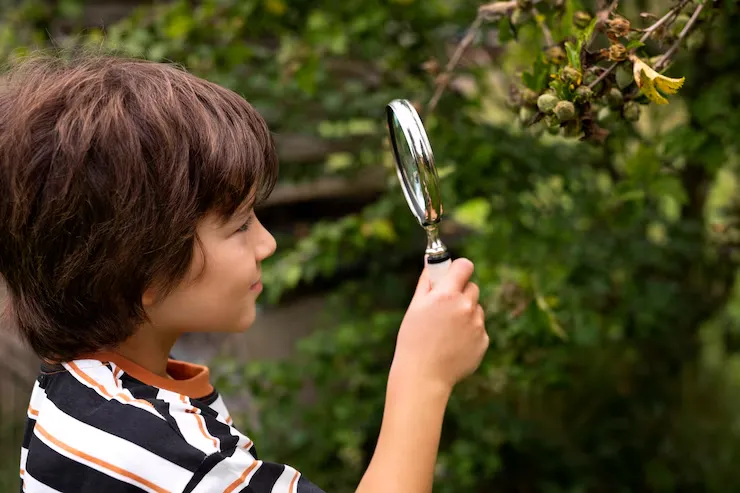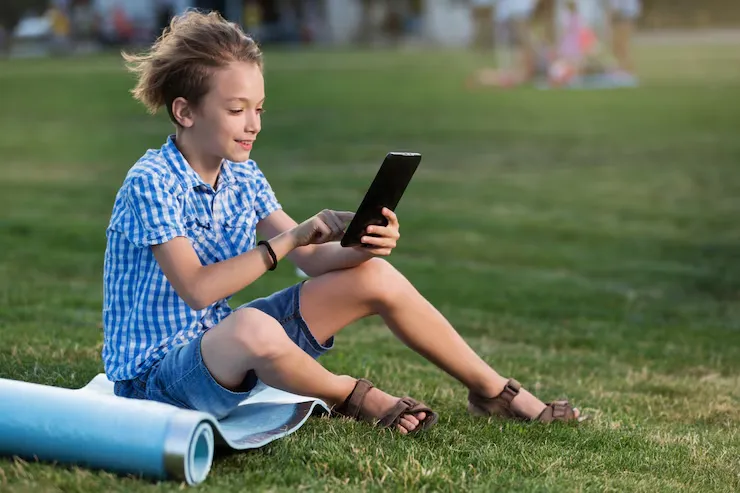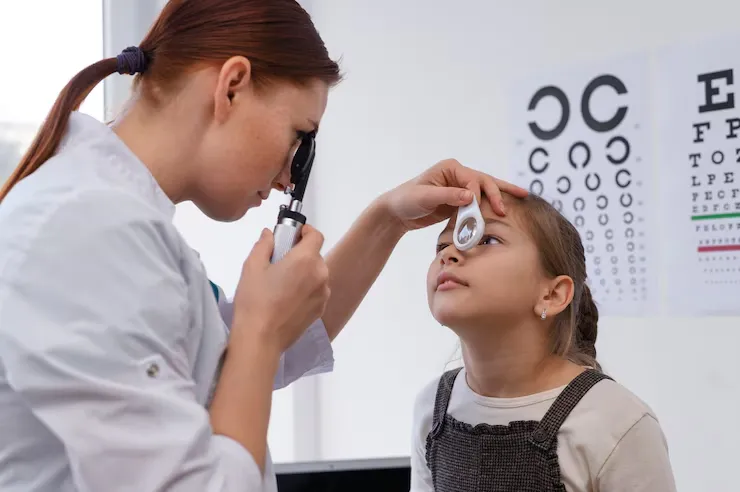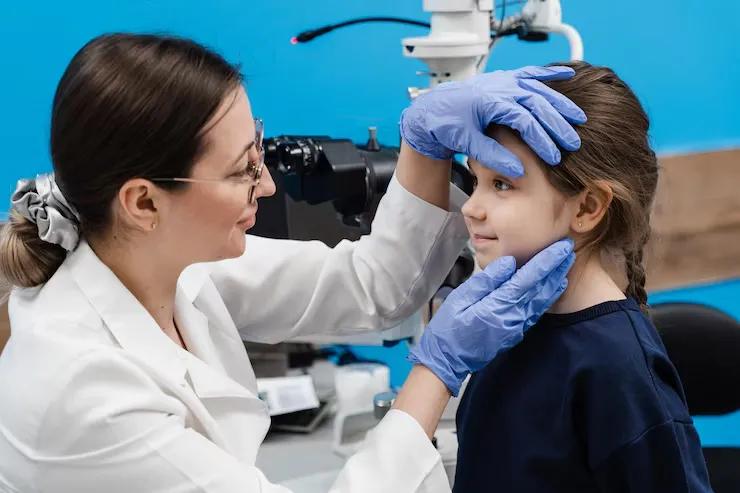Pediatric Eye Health
Outdoor Activities and Myopia Prevention in Children
FSDAVCFEBFEVSDDVFSD
FSDAVCFEBFEVSDDVFSD
FSDAVCFEBFEVSDDVFSD
Understanding Myopia in Children
Myopia, or nearsightedness, is a common vision condition where distant objects appear blurry. In children, myopia typically develops between ages 6 and 14 and can progress rapidly during growth spurts. Factors contributing to myopia include genetics, prolonged near work, and limited exposure to natural light. Recent studies have highlighted the significant role of environmental factors, particularly outdoor activities, in influencing the onset and progression of myopia. Understanding these factors is crucial for parents aiming to protect their children's vision health.
Research indicates that increased time spent outdoors is associated with a reduced risk of developing myopia in children. Natural light exposure during outdoor activities is believed to stimulate dopamine release in the retina, which helps regulate eye growth and prevent elongation, a key factor in myopia development. Encouraging regular outdoor play can be an effective strategy in myopia prevention. Parents should be aware of the importance of balancing indoor activities with sufficient time spent outside to support their children's eye health.
Myopia, or nearsightedness, is a common vision condition where distant objects appear blurry. In children, myopia typically develops between ages 6 and 14 and can progress rapidly during growth spurts. Factors contributing to myopia include genetics, prolonged near work, and limited exposure to natural light. Recent studies have highlighted the significant role of environmental factors, particularly outdoor activities, in influencing the onset and progression of myopia. Understanding these factors is crucial for parents aiming to protect their children's vision health.

Research indicates that increased time spent outdoors is associated with a reduced risk of developing myopia in children. Natural light exposure during outdoor activities is believed to stimulate dopamine release in the retina, which helps regulate eye growth and prevent elongation, a key factor in myopia development. Encouraging regular outdoor play can be an effective strategy in myopia prevention. Parents should be aware of the importance of balancing indoor activities with sufficient time spent outside to support their children's eye health.

The Impact of Outdoor Time on Myopia Risk
Numerous studies have demonstrated the protective effect of outdoor activities against myopia in children. For instance, a study published in Scientific Reports found that increasing outdoor time from 1 to 3 hours daily could reduce the risk of developing myopia by 50% . Similarly, research in Ophthalmology concluded that higher levels of total time spent outdoors were associated with less myopia and a more hyperopic mean refraction, even after adjusting for near work, parental myopia, and ethnicity.
The mechanism behind this protective effect is thought to involve the stimulation of dopamine release in the retina by natural light exposure, which inhibits excessive eye growth. Additionally, outdoor activities often involve looking at distant objects, reducing the strain associated with prolonged near work. These findings underscore the importance of integrating outdoor time into children's daily routines as a preventive measure against myopia.
Incorporating outdoor activities into school schedules has also shown promise. A study in JAMA reported that adding 40 minutes of outdoor activity during school hours resulted in a reduced incidence rate of myopia over the next three years. These collective findings highlight the significant role of outdoor time in mitigating myopia risk among children.
Balancing Screen Time and Outdoor Activities

In today's digital age, children are increasingly engaged in screen-based activities, leading to prolonged near work and reduced time spent outdoors. This shift has been linked to a higher prevalence of myopia. To counteract this trend, it's essential to establish a balance between screen time and outdoor activities. Encouraging children to take regular breaks from screens and engage in outdoor play can alleviate eye strain and promote healthier visual development.

Parents can implement strategies such as setting daily limits on screen time, promoting outdoor hobbies, and organizing family activities that involve spending time outside. Schools can also contribute by incorporating outdoor recess and physical education classes into the curriculum. By creating an environment that values and facilitates outdoor activities, we can help reduce the risk of myopia in children. Moreover, regular eye examinations are crucial for early detection and management of vision issues.
While technology offers undeniable educational benefits, it’s crucial to balance its use with eye health. Prolonged screen time can strain the eyes and increase the risk of myopia, especially in children. Educating kids about the importance of visual breaks and proper screen habits empowers them to make healthier choices. Simple actions like maintaining a safe viewing distance, using proper lighting, and following the 20-20-20 rule—taking a 20-second break every 20 minutes to look at something 20 feet away—can significantly reduce digital eye strain.
Encouraging outdoor play is another vital step in preventing myopia. Natural light and physical activity not only promote overall health but also play a role in regulating eye growth, reducing the risk of vision problems. For a comprehensive approach, combine healthy screen habits with regular eye exams to ensure early detection and management of any vision concerns. Learn more about the Importance of Pediatric Eye Exams for Early Detection in our detailed article.
Practical Tips for Parents
Parents play a crucial role in protecting their children’s vision and fostering healthy habits. Encouraging at least two hours of outdoor play daily—whether through sports, biking, or simple park activities—can significantly benefit eye health. Limiting screen time and following the 20-20-20 rule, which involves taking a 20-second break to look at something 20 feet away every 20 minutes, helps reduce digital eye strain and supports better focus. Creating outdoor-friendly spaces at home or in the community ensures children have safe and accessible areas to stay active.
Leading by example is equally important. Families who engage in outdoor activities together not only bond but also reinforce the importance of spending time outside. By combining these practices with regular eye exams, parents can monitor vision development and address potential issues early. At Kleinwood Vision, we offer specialized pediatric eye care services to support your child’s long-term vision health.
Kleinwood Vision’s Commitment to Pediatric Eye Health
At Kleinwood Vision, we are committed to addressing the rising concern of myopia among children through comprehensive eye care solutions. Our services include detailed pediatric eye exams, personalized myopia management plans, and expert guidance on lifestyle adjustments to support long-term eye health. We stress the importance of early detection and intervention to slow myopia progression effectively.
Our experienced optometrists collaborate closely with families to integrate strategies such as increased outdoor activities and reduced screen time into daily routines. We also offer advanced treatments, including orthokeratology and multifocal contact lenses, tailored to each child’s unique needs, ensuring optimal care and results.
At Kleinwood Vision, we are committed to addressing the rising concern of myopia among children through comprehensive eye care solutions. Our services include detailed pediatric eye exams, personalized myopia management plans, and expert guidance on lifestyle adjustments to support long-term eye health. We stress the importance of early detection and intervention to slow myopia progression effectively.
Our experienced optometrists collaborate closely with families to integrate strategies such as increased outdoor activities and reduced screen time into daily routines. We also offer advanced treatments, including orthokeratology and multifocal contact lenses, tailored to each child’s unique needs, ensuring optimal care and results.


With a proactive blend of clinical expertise and lifestyle-focused solutions, we aim to preserve and enhance children’s vision. Explore our myopia management services and take the first step toward safeguarding your child’s vision.
Conclusion
The increasing prevalence of myopia among children has become a pressing public health concern, with long-term implications for their visual and overall well-being. However, proactive measures can significantly reduce its progression. Encouraging daily outdoor activities, such as sports or unstructured play, is one of the most effective strategies. Time spent outdoors helps regulate healthy eye growth and can delay the onset of myopia.
Balancing screen time is equally essential. Excessive use of digital devices strains young eyes and can accelerate myopia progression. Simple practices like the 20-20-20 rule—taking a 20-second break to look at something 20 feet away every 20 minutes—can alleviate digital eye strain. Parents and educators play a critical role in monitoring screen use and encouraging healthier habits.
Regular eye exams are vital for early detection and management of myopia. A professional evaluation can identify vision changes before they significantly impact a child’s quality of life. Early intervention options, such as orthokeratology or multifocal lenses, can help slow myopia progression and protect long-term vision. These treatments, combined with lifestyle modifications, form a comprehensive approach to managing myopia.
At Kleinwood Vision, we are dedicated to empowering families with knowledge and tailored solutions for myopia prevention and management. Our experienced team works closely with parents to develop effective strategies, ensuring children enjoy clear, healthy vision for years to come. Together, we can take steps to combat the growing challenge of myopia and build a future of better visual health. Visit us to learn more about our myopia management services and how we can support your child’s vision journey.
Additional Resources
For parents looking to safeguard their child’s vision, understanding myopia and its impact is a critical first step. Myopia, or nearsightedness, can affect more than just vision—it can influence a child’s learning, confidence, and overall quality of life. By learning about its causes and consequences, families can take timely action to manage and prevent its progression.

For parents looking to safeguard their child’s vision, understanding myopia and its impact is a critical first step. Myopia, or nearsightedness, can affect more than just vision—it can influence a child’s learning, confidence, and overall quality of life. By learning about its causes and consequences, families can take timely action to manage and prevent its progression.
Promoting healthy habits is another key component. Simple strategies, such as managing screen time to reduce digital eye strain and encouraging outdoor play, can significantly benefit a child’s eye health.
Promoting healthy habits is another key component. Simple strategies, such as managing screen time to reduce digital eye strain and encouraging outdoor play, can significantly benefit a child’s eye health.
Outdoor activities not only support visual development but also contribute to overall well-being. Incorporating these practices into daily routines can create a balanced environment for healthy vision.
At Kleinwood Vision, we offer comprehensive pediatric eye care services, including myopia management and preventive solutions. By staying informed and working together, we can ensure children enjoy a bright future with clear, healthy vision.
Schedule an Eye Exam Today
Early detection plays a vital role in managing and preventing the progression of myopia in children. Regular eye examinations help monitor vision development and identify potential issues before they worsen. Addressing myopia early not only ensures clearer vision but also reduces the risk of more serious eye health complications later in life. For parents, scheduling routine checkups is a proactive way to prioritize their child’s long-term visual health.
At Kleinwood Vision, we are committed to providing comprehensive, personalized care tailored to your child’s unique needs. Our experienced team of optometrists offers thorough eye evaluations and effective solutions for myopia management, ensuring your child’s vision remains clear and healthy. Don’t wait for symptoms to progress—take the first step towards safeguarding your child’s eyesight. Contact us today to book an appointment and learn how we can support your family’s eye care journey.

Contact Info
Hours of Operation
Mon - Fri | 9:00 AM - 5:00 PM
Sat - Sun | Closed
Holiday Hours: We are closed for the following holidays: New Years Day, Memorial Day, Independence Day, Labor Day, Thanksgiving Day, Christmas Day
© 2026 Kleinwood Vision. All rights Reserved.


